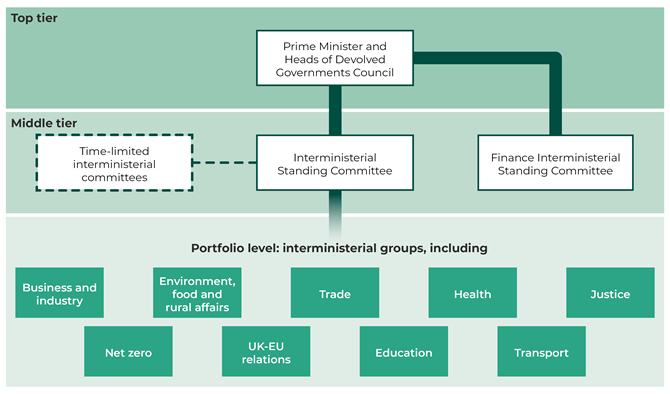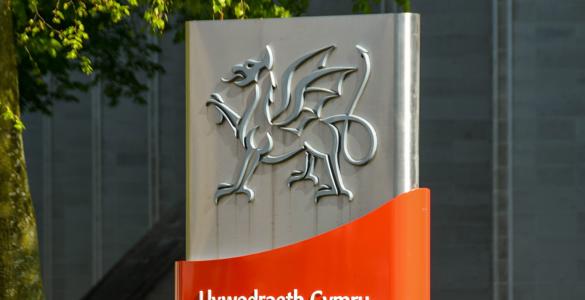Now that the UK has left the EU, it’s widely recognised that the UK and devolved governments have to work together more closely, particularly on:
- managing policy divergence between different parts of the UK outside the EU single market; and
- the negotiation and implementation of international obligations.
In 2018, the UK and devolved governments commissioned a review of intergovernmental relations to “ensure they are fit for purpose in light of the UK’s exit from the EU”. In January 2022, the governments reached agreement.
Last week, the Welsh Government’s Counsel General told the Senedd’s Legislation, Justice and Constitution Committee that the agreement on the review was a “significant constitutional step forward”, describing the new dispute resolution process as “groundbreaking”. However, he said that agreement depended on “all four Governments working in the spirit of making it work”.
The basis for intergovernmental relations
Under the Memorandum of Understanding on Devolution (2013), the governments agreed to work together through the Joint Ministerial Committee (JMC). The JMC was described as a consultative body: it could make agreements, but not binding decisions.
In 2017, the Welsh Government argued the JMC should be reformed into a ‘Council of Ministers’, and this should be able to make decisions by consensus, or by a vote of a combination of the UK and one of the devolved governments. The Welsh Government has also said intergovernmental relations should have a statutory basis.
The Review of Intergovernmental Relations (‘the review’) sets out that the governments should make joint decisions, but by consensus. It doesn’t provide for intergovernmental relations to be given a statutory basis.
New intergovernmental structures
The governments have agreed to set up three new tiers for interministerial engagement to replace the JMC:
- interministerial groups at portfolio or departmental level (some existing, some yet to be established);
- an Interministerial Standing Committee (IMSC) to consider cross-cutting issues, and a Finance Interministerial Standing Committee (F:ISC); and
- a Prime Minister and Heads of Devolved Governments Council (Council) to provide oversight of “the system of multi-level governance created by devolution”.
The governments agreed to hold meetings of the IMSC, F:ISC and Council at regular intervals, and to rotate chairs and locations of IMSC meetings. They also agreed to issue guidance on rotating chairing and location and frequency of meetings for interministerial groups.
A joint Secretariat will be established, made up of officials from each government but accountable to the Council.
It’s not clear how long it will take for the new intergovernmental structures to be fully established. The IMSC held its first meeting this week. The Council has not yet held its first meeting.

Key areas of cooperation
The review sets out new ways the governments will cooperate across a range of key areas of shared responsibility.
The new IMSC will be responsible for:
- providing oversight of the common frameworks programme; and
- considering issues that “have an impact on regulatory standards across the UK for internal trade”.
This could include oversight of the operation of the UK Internal Market Act and of how the governments will make decisions on agreeing exclusions from the Act.
The IMSC will consider cross-cutting international issues and the implementation, development and impact of international obligations in devolved areas.
Ministers will also engage on international affairs at portfolio level through the interministerial group on trade and other relevant interministerial groups.
The governments will consider implementation of UK-EU agreements through an interministerial group on the UK-EU Trade and Cooperation Agreement. This will sit alongside separate UK Government commitments on devolved engagement in UK-EU forums.
The Finance Interministerial Standing Committee (F:ISC) will consider economic and fiscal issues. The F:ISC will have a separate secretariat and dispute resolution process.
The governments have agreed that funding decisions are reserved to the UK Treasury. Funding disputes may only be raised where there is reason to believe a principle of the Statement of Funding Policy may have been breached.
They also agree that disputes on the Welsh and Scottish fiscal frameworks will continue to be managed through the processes set out in those frameworks.
Resolving disputes
The JMC had a process for resolving disputes. However, devolved governments and parliamentary committees criticised the process, arguing the UK Government could decide whether disputes are taken forward or not. The Welsh Government argued in 2017 that a reformed ‘Council of Ministers’ should resolve disputes, and those decisions should be binding.
The review outlines that the governments have agreed a new three-stage dispute resolution process, from portfolio level to the IMSC or F:ISC and finally to the Council. It makes some significant changes to the existing dispute resolution process, in particular by:
- introducing criteria for escalation: if a disagreement arises at portfolio level, it can be referred to the secretariat. The secretariat will assess whether the disagreement has been extensively discussed already and whether it has implications beyond its policy area before escalating;
- introducing time limits: disputes referred to the IMSC must be considered by senior intergovernmental officials within ten working days and by the IMSC or F:ISC within ten more, unless otherwise agreed. Disputes referred to the Council must be considered within one month;
- requiring the chairs of meetings not to be a representative of a government that is party to the dispute. The chair will not have a decision-making role. If a dispute reaches the Council, the Prime Minister will chair;
- requiring third party advice or mediation to be sought ahead of escalation to the Council, unless all parties agree not to do this; and
- requiring reporting: governments will report on the outcome of disputes at the IMSC or Council to their legislatures (including third party advice).
There are unresolved disagreements between the UK Government and the Welsh Government, including over post-Brexit legislation on subsidy control and professional qualifications. It’s not clear if the Welsh Government intends to raise any of these through the new dispute resolution process.
Transparency and parliamentary accountability
In 2018, the Fifth Senedd’s Constitutional and Legislative Affairs Committee recommended that intergovernmental relations should be transparent and accountable. The Welsh Government agreed to report regularly to the Senedd on intergovernmental relations.
In the review, the governments agree to ‘enhanced reporting’ on intergovernmental working, with the secretariat publishing an annual report.
However, concerns have been raised that these commitments on transparency aren’t proportionate to the increased importance of intergovernmental working after Brexit. In February, the Scottish Parliament’s Constitution Committee recommended that there should be no dilution of public consultation or of parliamentary scrutiny as a result of intergovernmental working and common frameworks.
Parliaments may also seek to improve scrutiny of intergovernmental relations through closer interparliamentary working. On 25 February, parliamentarians from across the UK met in a new Interparliamentary Forum. In a joint statement, they agreed to:
aim to improve scrutiny through the mutual exchange of information and by seeking a consistent approach to improving transparency and accountability at both a Ministerial and inter-governmental level.
With disagreements between the governments continuing and timelines for implementing the review unclear, it remains to be seen how the new intergovernmental structures will develop and how they will be scrutinised.
Article by Lucy Valsamidis, Senedd Research, Welsh Parliament






